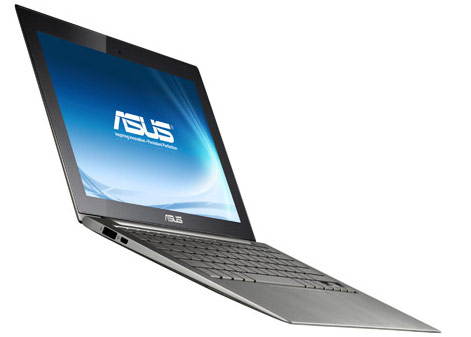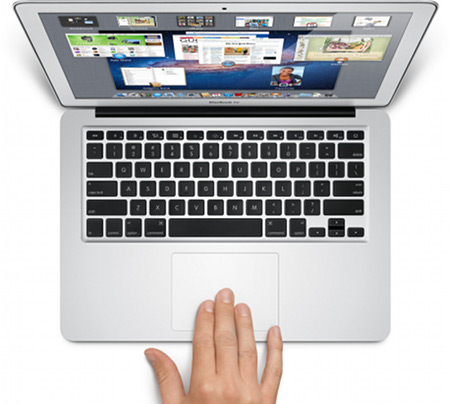Acer, Asus, Lenovo take Intel’s Ultrabook bait
Aug 12, 2011 — by LinuxDevices Staff — from the LinuxDevices Archive — viewsAcer, Asus, and Leonvo will roll out “Ultrabook” portable computers for under $1000 in the fourth quarter of this year, according to a DigiTimes report. Resembling Windows versions of the successful Apple MacBook Air, the devices will be less than 0.8 inches thick, use Intel Core processors, and employ SSD (solid state disk) storage.
Sean Maloney, Intel executive vice president and the newly appointed head of the chip makers China business, introduced the "Ultrabook" idea during his keynote speech May 31 at the Computex 2011 show in Taiwan. The chip giant has trademarked the name, which it says refers to notebooks that:
- are less than 20mm (0.8 inch) thick
- use Core processors
- start up almost instantly with the aid of SSD (solid state disk) storage
- and have "mainstream price points under US$1,000"
Intel stated Aug. 10 that initial Ultrabooks will be available for this year's holiday shopping season, and will be powered by its current "Sandy Bridge" Cores. A next generation using forthcoming, 22nm "Ivy Bridge" Core CPUs will come out in the first half of 2012, the company added.
The third step in the Ultrabook device progression will come in 2013, when products based on "Haswell" Core processors will be released, Intel said. These devices will reduce power consumption to "half of the 'thermal design point' for today's microprocessors," the chip giant promised.
Apparently, though, Intel has faced considerable skepticism from Taiwan-based computer manufacturers. A July 4 DigiTimes report claimed the chipmaker is "paying handsomely to attract downstream vendors into launching Ultrabooks," but vendors were skeptical that prices could reach as low as $1,000.

The Asus UX-21
A July 27 followup story claimed "actual production costs render the hope practically infeasible. The 11.6-inch Asus UX21 (above) and a 13.1-inch followup called the UX31 will cost between $1,000 and $1,600 because "yield rates for panels and key components are still lower than originally expected and therefore production costs are relatively high," DigiTimes added.
On Aug. 11, meanwhile, Intel Capital announced a $300 million fund designed to help foster the "Ultrabook" category of portables. The money will be invested over the next three to four years "to create a cycle of innovation and system capabilities for this new and growing category of mobile devices," the company said.
Intel spiffs bring Ultrabook results
That extra injection of cash might just have done the trick, as DigiTimes reported Aug. 12. Ultrabook product roadmaps were unveiled at an Aug. 11 symposium in Tapei by Intel's Maloney, according to authors Monica Chen and Steve Shen.
Acer, Asus, and Lenovo, "among others," are now confirmed to be rolling out sub-$1000 Ultrabooks in the fourth quarter of this year, DigiTimes reports. But, some "local makers of parts and components still hold a wait-and-see attitude toward the project," the story says.
Some notebook makers are "skeptical about the target prices," indicating that total BOM (bill of materials) for an 11.6-inch ultrabook is expected to top US $700, write Chen and Shen. "The sub-US$999 target price could be sustained if Intel is willing to lower its CPU prices and hand out a subsidy of US $100 per unit for marketing efforts," they add.
The only confirmed "Ultrabook" to date is the Asus UX21 pictured earlier in this story, which was shown off at Computex. This device will be just 2/3rds of an inch thick, according to Asus, and it will reportedly use the Core i5-2557M (two cores, 1.7GHz base clock speed and 2.7GHz TurboBoost speed, 17-Watt TDP) that Intel announced at the end of June. This CPU itself currently costs $250, according to Intel.
Meanwhile, Apple's revamped Macbook Air — launched July 20 — seems to exemplify an Ultrabook, right down to a "Sandy Bridge" Core processor, Intel's Thunderbolt interconnect technology, SSD storage, and a thickness of just 0.68 inches.

An Ultrabook in all but name: Apple's MacBook Air
Apple's entry-level Air has a 1.6GHz Core i5 processor, an 11.6-inch display, and a 64GB SSD, while the top model has a 1.7GHz i5, a 13.3-inch display, and a 256GB SSD. These portables — which can run Microsoft Windows as well as Apple's own OS X — are priced at $1,000 and $1,600, respectively.
We've previously aired our suspicions that Apple's leverage with suppliers is bringing it lower costs than those prospective Ultrabook manufacturers face. (That would be the same reason that most Android tablets sell for just as much as Apple's iPad 2 — despite being mere knockoffs in the eyes of consumers.)
Further, The Wall Street Journal has quoted Greg Welch, director of Intel's Ultrabook group, as saying Apple informed the chipmaker that it had to drastically slash the power consumption of its chips or it would likely lose Apple's business. "It was a real wake-up call to us," Welch is said to have noted.
This Intel-produced video promotes Ultrabooks
(click to play)
Jonathan Angel can be reached at [email protected] and followed at www.twitter.com/gadgetsense.
This article was originally published on LinuxDevices.com and has been donated to the open source community by QuinStreet Inc. Please visit LinuxToday.com for up-to-date news and articles about Linux and open source.